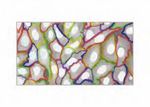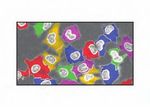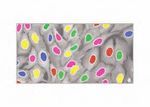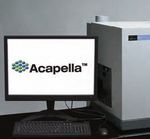A POWERFUL SET OF TOOLS FOR YOUR CELLULAR ASSAY DEVELOPMENT - ACAPELLA
←
→
Page content transcription
If your browser does not render page correctly, please read the page content below
A POWERFUL
set of tools
for YOUR cellular
assay development
Acapella
Image analysis system with
distributed data processing.ACAPELLA
Acapella
A COMPREHENSIVE
Toolbox for
High Content Acapella is a highly flexible and
powerful image data processing
Image Analysis system that can be applied to a broad
range of applications. It comes with a set of
ready-made application solutions, or “Scripts”, with instructions to use and modify,
as well as being fully flexible for new algorithm development. The Acapella Script
Collection is regularly extended and is available to all Acapella users.
Acapella is suited to all high throughput, high content cellular assays, and in particular
to multiplex assays. Its open architecture allows you to develop assays by building on
essential analysis steps such as nucleus detection, cytoplasm detection, cell compartment
detection and quantifying events within the detected segments so that you can be
sure that your new assays are built on firm foundations. You can select and combine
algorithms by using visual feedback. A comprehensive range of best-fit algorithms
is included, each optimized for cell type, staining and imaging conditions.
2High Speed High Content Screening –
powered by the Acapella runtime system
Key Features
Acapella is a runtime system with the processing power • Set of ready-made applications for immediate use, or to
to analyze huge image data loads while all its algorithms use as a starting point for new applications.
are optimized for speed. When used with the high • Open architecture for creation of new assays – provides
throughput Opera High Content Screening System, ultimate flexibility for development of algorithms.
online image analysis can be achieved using a scalable • Optimized for high speed online image analysis and for
distributed computing system. By using multiple processors processing large data sets.
and parallel processing, results can be obtained online • Superior segmentation algorithms for accurate separation
quickly and efficiently from very large High Content on even confluent cell layers.
Screening campaigns. • Unique, comprehensive collection of algorithm sets for nucleus,
cell body and spot detection that allows new applications to be
A Linux Edition is also available, offering full support for developed by using “choose best-fit and combine” approach.
cluster technology, ultra high speed image analysis and
analysis of even larger data sets.
General Cellular Assay Library – create your own solutions in Acapella
Developing your own customized assays is easy in Acapella. Starting with the Cellular Assay Library, cells can be identified reliably from
nuclear stain.
Nucleus Detection
Cellular Assay Detection libraries allow
Cell Detection the best choice to be selected from a
comprehensive range of algorithms.
Compartment Detection
The Region Selection Tools make it very easy to define cellular regions using intuitive commands. Regions of Interest (ROIs)
can be defined on a per-cell basis and the superior segmentation algorithms in Acapella allow accurate region separation, even
for cells in a confluent state and for all types of cell morphology. This means that Acapella can be used successfully for a very
large range of cellular assays.
“NucleusRegion” can be used to identify “MembraneRegion” reliably identifies
then count cells in a population, these the plasma membrane areas of cells.
parameters can subsequently be used
for housekeeping assays such as cell
viability in cell proliferation.
“RingRegion” allows the creation of “CytoplasmRegion” identifies the
cytoplasm ROIs with variable areas entire cytoplasm area for any kind of
around the nucleus. cell shape.
Analysis of translocation assays such as cytoplasm-to-nucleus or cytoplasm-to-membrane can be created easily in a few simple
steps. For more advanced analysis tasks, Acapella has a comprehensive set of image analysis functions (erosion, dilation, masks, filters,
arithmetic functions, etc).Create your own customized solutions
Take an example from the Acapella Script Collection – Add Specific Application Libraries –
and customize! Neurite Outgrowth Analysis Library
You can create highly customized analysis solutions using the The Neurite Outgrowth Analysis Library can be purchased as
Cellular Assay Library beginning with a suitable example from an add-on to your system. It uses best in class algorithms for
the Acapella Script Collection. The example below shows the neurite detection, classification and quantification. Individual
quantifying differentiation status of a mixed cell population. cell neurites can be identified and allocated to individual cells,
Output parameters can be added as required. for accurate and precise results.
In this example, neuronal Parameters that can be quantified include:
and glial cells, differentiated
• Number of cells • Number of root neurites
from embryonal stem cells,
are stained for Tuj1 (red) and • Individual cell label • Number of branch points
GFAP (green).
• Total length of neurites • Number of extreme neurites
• Longest neurite of a cell
Primary neurons labeled with
a neuronal-specific green
fluorescent antibody and a
red fluorescent nuclear dye.
Using the Neurite Outgrowth Analysis Library, cells can be
The cytoplasmic regions of all cells are identified using the advanced analyzed for branch level and number of neurites per cell.
Acapella algorithms, allowing quantification of neuronal and glial cell
marker. From mean marker intensity per cell to detailed information on
a cell-by-cell basis in just a few steps, Acapella provides full control over
output parameters.
www.perkinelmer.com/acapella 4Acapella Range and Options
Key Functionality Acapella Script Collection
Editor and player functions Included with Detection Libraries
Image and data manipulation modules for:
• Data input / output
• Statistical analysis
• Arithmetic operations
• Image processing
• Feature and object recognition
• Object filtering
• Population analysis
• Data visualization
Detection Libraries
Cellular Assay Library
Set of building blocks for convenient assay
development comprising:
• Nucleus Detection
• Cytoplasm Detection Acapella Script Collection
• Object Region Selection
• Spot Quantification
RMCA Licenses
Neurite Outgrowth Analysis Library Acapella scripts can run on a scalable cluster of the Opera™
High Throughput Image Analysis PCs for parallel image
Set of algorithms for analysis of neurites processing using ReMote Cell Analyzer (RMCA) licenses,
providing online image analysis during screening.
Technical Information
System Requirements Image Formats
Acapella requires Microsoft® Windows® XP or Vista® Acapella will accept over 30 standard image formats, such as
Minimum specification: Pentium III 1 GHz, 512 MB RAM,
® TIFF, JPEG, GIF, etc.
1 GB free HD
Data Export
Recommended specification: Pentium® 4.3 GHz, 1 GB RAM,
10 GB free HD Data can be exported from Acapella as .xml or .csv format
Acapella Linux Edition requires OpenSuSE 10.3 64 bit
Minimum specification: Intel® Core™ 2, 2 GHz, 2 GB RAM,
1 GB free HD
Recommended specification: Intel® QuadCore 4.3 GHz,
4 GB RAM, 10 GB free HD
5PerkinElmer, Inc. 940 Winter Street Waltham, MA 02451 USA P: (800) 762-4000 or (+1) 203-925-4602 www.perkinelmer.com For a complete listing of our global offices, visit www.perkinelmer.com/ContactUs Copyright ©2009, PerkinElmer, Inc. All rights reserved. PerkinElmer® is a registered trademark of PerkinElmer, Inc. All other trademarks are the property of their respective owners. 008076A_02
You can also read



























































